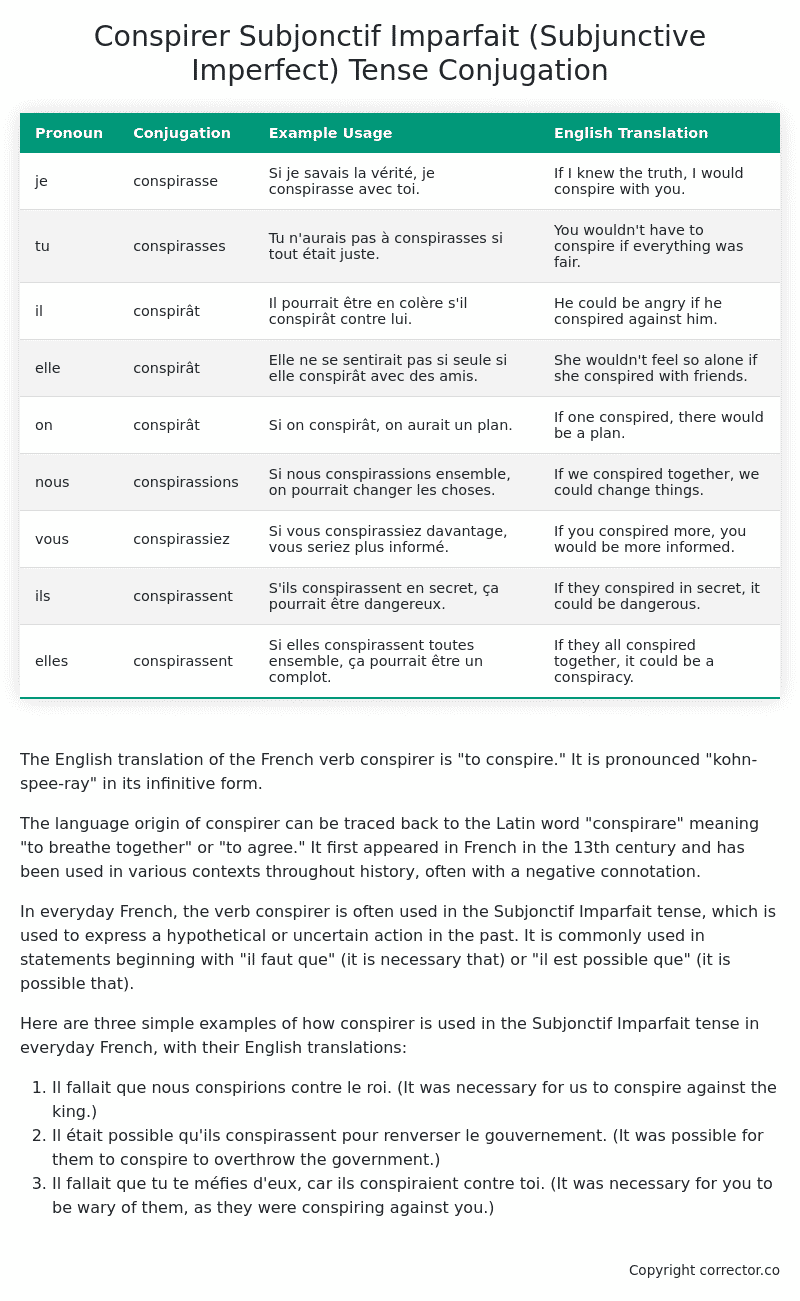Subjonctif Imparfait (Subjunctive Imperfect) Tense Conjugation of the French Verb conspirer
Introduction to the verb conspirer
The English translation of the French verb conspirer is “to conspire.” It is pronounced “kohn-spee-ray” in its infinitive form.
The language origin of conspirer can be traced back to the Latin word “conspirare” meaning “to breathe together” or “to agree.” It first appeared in French in the 13th century and has been used in various contexts throughout history, often with a negative connotation.
In everyday French, the verb conspirer is often used in the Subjonctif Imparfait tense, which is used to express a hypothetical or uncertain action in the past. It is commonly used in statements beginning with “il faut que” (it is necessary that) or “il est possible que” (it is possible that).
Here are three simple examples of how conspirer is used in the Subjonctif Imparfait tense in everyday French, with their English translations:
- Il fallait que nous conspirions contre le roi. (It was necessary for us to conspire against the king.)
- Il était possible qu’ils conspirassent pour renverser le gouvernement. (It was possible for them to conspire to overthrow the government.)
- Il fallait que tu te méfies d’eux, car ils conspiraient contre toi. (It was necessary for you to be wary of them, as they were conspiring against you.)
Table of the Subjonctif Imparfait (Subjunctive Imperfect) Tense Conjugation of conspirer
| Pronoun | Conjugation | Example Usage | English Translation |
|---|---|---|---|
| je | conspirasse | Si je savais la vérité, je conspirasse avec toi. | If I knew the truth, I would conspire with you. |
| tu | conspirasses | Tu n’aurais pas à conspirasses si tout était juste. | You wouldn’t have to conspire if everything was fair. |
| il | conspirât | Il pourrait être en colère s’il conspirât contre lui. | He could be angry if he conspired against him. |
| elle | conspirât | Elle ne se sentirait pas si seule si elle conspirât avec des amis. | She wouldn’t feel so alone if she conspired with friends. |
| on | conspirât | Si on conspirât, on aurait un plan. | If one conspired, there would be a plan. |
| nous | conspirassions | Si nous conspirassions ensemble, on pourrait changer les choses. | If we conspired together, we could change things. |
| vous | conspirassiez | Si vous conspirassiez davantage, vous seriez plus informé. | If you conspired more, you would be more informed. |
| ils | conspirassent | S’ils conspirassent en secret, ça pourrait être dangereux. | If they conspired in secret, it could be dangerous. |
| elles | conspirassent | Si elles conspirassent toutes ensemble, ça pourrait être un complot. | If they all conspired together, it could be a conspiracy. |
Other Conjugations for Conspirer.
Le Present (Present Tense) Conjugation of the French Verb conspirer
Imparfait (Imperfect) Tense Conjugation of the French Verb conspirer
Passé Simple (Simple Past) Tense Conjugation of the French Verb conspirer
Passé Composé (Present Perfect) Tense Conjugation of the French Verb conspirer
Futur Simple (Simple Future) Tense Conjugation of the French Verb conspirer
Futur Proche (Near Future) Tense Conjugation of the French Verb conspirer
Plus-que-parfait (Pluperfect) Tense Conjugation of the French Verb conspirer
Passé Antérieur (Past Anterior) Tense Conjugation of the French Verb conspirer
Futur Antérieur (Future Anterior) Tense Conjugation of the French Verb conspirer
Subjonctif Présent (Subjunctive Present) Tense Conjugation of the French Verb conspirer
Subjonctif Passé (Subjunctive Past) Tense Conjugation of the French Verb conspirer
Subjonctif Imparfait (Subjunctive Imperfect) Tense Conjugation of the French Verb conspirer (this article)
Subjonctif Plus-que-parfait (Subjunctive Pluperfect) Tense Conjugation of the French Verb conspirer
Conditionnel Présent (Conditional Present) Tense Conjugation of the French Verb conspirer
Conditionnel Passé (Conditional Past) Tense Conjugation of the French Verb conspirer
L’impératif Présent (Imperative Present) Tense Conjugation of the French Verb conspirer
L’infinitif Présent (Infinitive Present) Tense Conjugation of the French Verb conspirer
Struggling with French verbs or the language in general? Why not use our free French Grammar Checker – no registration required!
Get a FREE Download Study Sheet of this Conjugation 🔥
Simply right click the image below, click “save image” and get your free reference for the conspirer Subjonctif Imparfait tense conjugation!

Conspirer – About the French Subjonctif Imparfait (Subjunctive Imperfect) Tense
Formation
Common Everyday Usage Patterns
Interactions with Other Tenses
Subjonctif Présent
Indicatif Passé Composé
Conditional
Conditional Perfect
Summary
I hope you enjoyed this article on the verb conspirer. Still in a learning mood? Check out another TOTALLY random French verb conjugation!


